i decided to make a tumblr for talking about games so that the other tumblr isnt an awful experience for people who just want to talk about games. I make ttrpgs - https://cardboardhyperfix.itch.io/ - cover photo: doodle from the comic I am making.
Last active 60 minutes ago
Don't wanna be here? Send us removal request.
Text
For Steel You Are - A Romance Journaling Game
For steel you are, And stone you hold, Your long beams stretch, And your deep pipes bring.
Inside you I am home, Inside you I am safe.
You guide me everywhere I go, Down walkways, and corridors, Expanses, and stairways.
Can I join you? Could I love you? Will you love me too?
What Is This ?
For Steel You Are is a solo journaling game about a robot who falls in love with an unfathomable megastructure. To play, you will need a place to write your responses, a d8 to roll, and a yearning deep inside for concrete, steel, and being like a mote of dust inside something beyond comprehension.
Every step you take within the Structure fills you with a sense of love and wonder that will soon render you unrecognizable. Love the Strucutre, and maybe it will love you too.
Inspired by BLAME!, NaissanceE, and The Ground Itself.
Made for the Faggot Game Jam!
90 notes
·
View notes
Text
Honestly, Ironsworn: Starforged is a really cool solo experience. I do need to play more solo games but this game is actually so well-designed to facilitate solo play. It's amazing how well the mechanics just click.
245 notes
·
View notes
Note
TABLETOP TRICK OR TREAT
TRICK THE THIRD 🎃🎃🎃:
PLASTIBOO, creator of Vermis and Vermis II, is one of the biggest influences on my work, and every year they make a scary halloween mask and here it is here is the halloween mask enjoy it
instagram
(Plastiboo also just released GODHUSK and im recommending that without having read it)
instagram
12 notes
·
View notes
Text
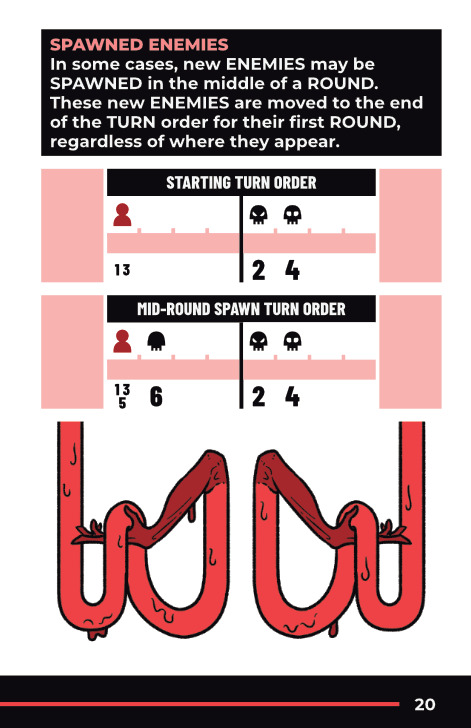
The art for GUTGUN is done!!! 40 pieces in total...it's taken some time to get done! Here's another preview, hopefully soon you'll be able to get your eyes on the game itself :) There's just a few more steps before release!
6 notes
·
View notes
Text
Deep Space & Derelicts: Basic/Xenotech version, an idea for a game
here's a little idea for a game that's been floating around my head for a while. what if early D&D had been based around classic scifi rather than classic fantasy, but otherwise kept the same structures. how would you translate, say, b/x dnd into a scifi game. Why B/X? because it's my favourite edition, that's why.
so. principles. We want to keep the basic structures of the game the same: descendingarmour class, xp-for-treasure, dungeon exploration, the seven classic classes, etc etc. like early dnd, we want to keep our setting minimal but with some strong implications, a template you can build your own scifi setting out of, with a grab-bag of relevant tropes and concepts thrown in. we want to keep the same gameplay loop.
So, our set-up. We replace 'adventurers' exploring 'dungeons' and later a 'wilderness' with 'salvagers' exploring 'derelict ships' and later 'deep space'. You get XP for the valuable salvage you can leave the derelict with. At first, you explore a given derelict room-to-room, and once you've done that your little salvager band can return to a space station, sell your loot, maybe buy new equipment or hire some followers, and move on to the next derelict and continue.
First big thing: classes. We want to keep our classes pretty simple, classic and broad, to cover wide archetypes. b/x dnd has seven classes: 4 human classes (fighter, thief, cleric, magic user) and 3 demihumans (dwarf, elf, halfling).
We will do likewise: 4 human classes, and three non-human classes.
The Fighter remains the same. High hit dice, access to all the best armour and weapons, done. No changes.
The Thief remains largely the same, too. We change up the thief skills a bit to represent the scifi setting, but a lot of them - find traps, open locks, etc - are still very applicable to the task of exploring a hostile space-derelict for salvage. The only one that we should probably replace is 'scale sheer surfaces', which gets turned into the more useful 'navigate zero-gravity'. these stay one key difference is, obviously, which weapons the thief gets, since we'll be using a different weapon list.
The Cleric is tonally off for scifi, but there's an easy archetype to replace it with: the Psychic. We can keep the 'turn-away undead' ability, but replace it with 'turn away people': it's a sort of jedi-mind-trick or psychic scream that causes people (whose minds are sensitive to these things) to avoid the psychic, and a 'destroyed' result is basically a headsplosion. The cleric Spells at level 2+ are replaced with Psychic Powers, that need to be readied through careful meditation and can then be unleashed later. Psychic healing, support, and a bunch of mystical utility powers.
Likewise, the Magic User is not great for scifi, so we can replace it with something better: the Network User. This is your hacker/technologist/admech type character. Their spellbook is replaced with a data-tablet, on which is stored the Programs (spells) they can use. They have a finite number of Programs they can store in their data-tablet's memory, prepped and ready to go with the flick of a switch. These can cover a wide variety of technobabble tasks, giving them the same utility as a regular magic user. As the Network User levels up, they expand their data-tablet's memory, allowing them to prepare more and stronger programs. Scrolls are replaced with data-chips, little portable one-shot files that you can use immediately, or plug into your data-tablet to learn whatever program's on the chip.
The demi-humans are equally simple to handle.
The Dwarf is replaced by the G.E.O. Aka, the Genetically Engineered Organism, custom made for space exploration. Tough, rugged, and short, able to see in the dark through heat-vision and with some perks for void-exploration such as the ability to spot certain space-hazards.
The Halfling is replaced by the Alien. Typically in the 'little green men' mould, the Alien is short, hard to hit and good at shrugging off hazards, good at sneaking, and a dab hand with a laser pistol.
Lastly, the Elf is replaced with the AI. An artificial intelligence in a synthetic body. The elf's immunities to sleep etc are replaced with the normal immunities for not being a biological life-form. The elf's sharper senses and infravision are likewise a product of the AI's advanced scanners and superior data processing. And, in the same way that the Network User can use Programs through training and their own data-pad, so too the AI has a built-in data-pad that lets them innately use Programs.
Now, the miscelania of the system.
Attributes are kept exactly as is, tbh. Frankly, 'Wisdom' makes just as much sense as a prime requisite for psychics as it does for clerics, in my view.
Saves get renamed. Death or Poison (D) remains the same. Wands (W) is replaced by Weapons, for saves against weird rays, sprays, beams, and other fanciful devices. Paralysis or Petrification (P) can again stay the same. Breath Attacks (B) becomes Blasts, for bombs, explosions and so on. And lastly Spells Rods or Staves (S) is replaced with Strange Effects, as a catch-all for everything else.
We can likewise rework equipment. Armour goes from Leather/Chain/Plate armour to Padded/Flack/Power armour. The weapon list gets re-worked: spears and bows are out, laser pistols and shotguns are in. We can add some proper space-utility-gear to the general equipment list: geiger counters, oxygen tanks, spray-glue, fire extinguishers, magnetic boots, etc.
Gold Pieces are replaced with Credits. Levelling still works the same way. Likewise, Magic Items are replaced with Xenotech, weird alien devices that do weird inexplicable things in ways that humans don't quite understand.
The party get a space-ship for free. It's a simple shuttle to get them between locations of interest. deepspace encounters replace wilderness encounters. Add a very barebones ship-to-ship system, we don't want it much more complex than the regular b/x combat rules.
Likewise, the mechanic at high levels for getting a stronghold and followers is kept; hit high levels and you can build a lil space station of your own, a cantina where similar salvagers will come to work under your leadership.
Dungeons are replaced with space derelicts, floating wrecks of spaceships an space-stations. Some are still protected by old security systems, and others have been infested by wandering space-monsters and such.
On the topic of which, space monsters! We can pretty much go through the standard monster manual reskinning.
Vat Soldiers covers our various orcs, goblins, ogres, trolls etc. Cloned mass produced soldiers for various space-empires, sometimes still fighting for those empires, sometimes lingering after the empire that created them fell. These are still, fundamentally, people just like you, but the fact they're all mass-produced to be soldiers (cannon-fodder for goblins, up to shock troops for trolls) warps their cultures around that.
Spacers is our equivallent of various human/elf/etc encounter types. Space merchants, bounty hunters, space pirates, vanguard soldiers of evil space-empires, etc etc. Drow, dero, dueragar etc are likewise alien space-empires; our klingons and moon-men and venusian amazons.
Nano-virus Creatures covers our undead. Something - probably a living thing - has been infested with nano-viruses that use its body as a host. Incorporeal undead are swarms of tiny nanobots in an almost intangible cloud; instead of being immune to magic, you need to hit them with energy attacks: fire, EMPs, etc.
Robots covers various constructs and artificial beings. Gargoyles, golems, animated armour, etc etc etc. All robots.
Space Monsters covers all our weird DnD shit. Wacky aliens, space whales, weird scifi anomalies, evil plants, giant carnivorous cubes. Frankly a giant eyeball monster that shoots weird beams all over the place is plenty at home in pulp scifi without any adaptation at all. Kinda a grab bag for All The Other Stuff.
As far as a campaign goes? Set up a hex-map for a local asteroid field. Scatter in some space-stations where towns would normally go, and some derelicts where dungeons would go. Come up with some random encounter charts for deep space between stations, map out some derelicts, roll up a party and go.
I have yet to *actually write it* but I think it's a pretty good skeleton for good old fashioned pulpy scifi. Illustrations can be liberally lifted from early 20th century pulps, there's plenty of good stuff out there.
no idea if i'll actually make this. my work laptop is in the repair shop right now, so i can't get started even if i want to. we shall see.
(yes, I know traveller exists, and yes I know stars without number exists. this is different. traveller is very much its own game that is still going strong, and SWN is a pretty clean modern scifi game with some osr stylings. *This* is a full-on, pretty faithful, retroclone, just with all the fantasy swapped out for scifi.)
83 notes
·
View notes
Text
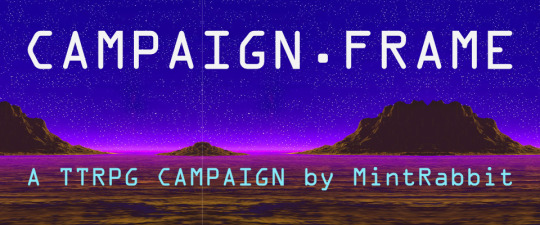
I just released my campaign outline for the Maple Jam! CAMPAIGN.FRAME is a multi-ttrpg campaign designed for online and forum play. Play as residents of a video game console learning about who they are by jumping into various video games and trying to protect their home city, COMMAND.COM.
This game also has a Google Sheets playkit for you to log your character details as you play.
62 notes
·
View notes
Text

Orbital Blues is our sad space western TTRPG. A roleplaying love-letter to retro futuristic sci-fi, vintage music, and narrative driven storytelling.
During character creation each player selects a Trouble for their interstellar outlaw. Troubles are summations of a character's past misgivings, misdeeds, vices or regrets. They provide fuel for character roleplay by providing narrative prompts such as "You escalate a situation in an attempt to get revenge". Acting on these prompts gives you Blues, a loose measure of your characters personal grievances and guilty hang-ups. Reaching 8 Blues allows your character to have a dramatic cinematic moment, Trouble's Brewing, where you confront the source of your Trouble and gain bonuses for dealing with it. (We like to joke this is "Sad for XP") Orbital Blues allows you to play out rules-light tabletop adventures in the style of space westerns such as Cowboy Bebop, Firefly and Guardians of the Galaxy.
27 notes
·
View notes
Text
Everyone should check out this actual play of Apocalypse World! It's doing something I think is pretty unique to AP - teaching the how and why of the game while also providing a really entertaining story.
49 notes
·
View notes
Note
Hi there!
Do you have any recommendations for games with mechanical depth that aren't focused on combat?
From my experience I'm thinking of primarily Burning Wheel, as well as Chuubo's. There's something just so compelling about presenting players with strong mechanical incentives and systems to master - while also being able to create narratives that don't need to center on fighting.
THEME: Non-Combat Mechanical Depth
Hello there! Mechanical depth is a tricky thing for me sometimes, especially when I'm reading about a game based on blogs or store descriptions. I think that much of the games I list here will be games I've talked about before, and while I personally think these games are complex, you might disagree! One through-line that I found in many of these games is that when you're not focusing on combat, the next most popular way to play with complex relationships.


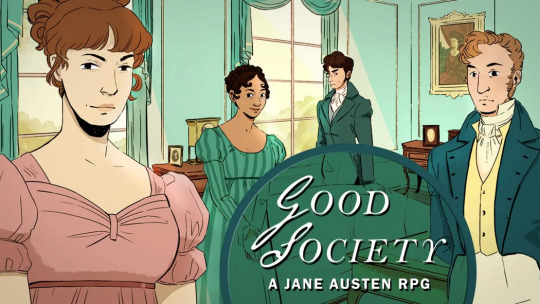
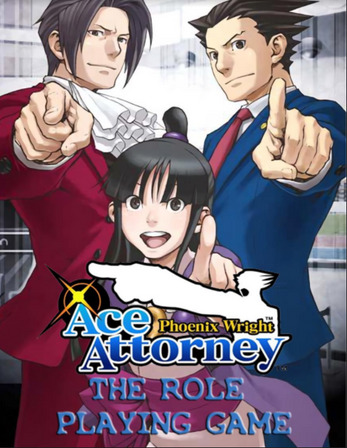
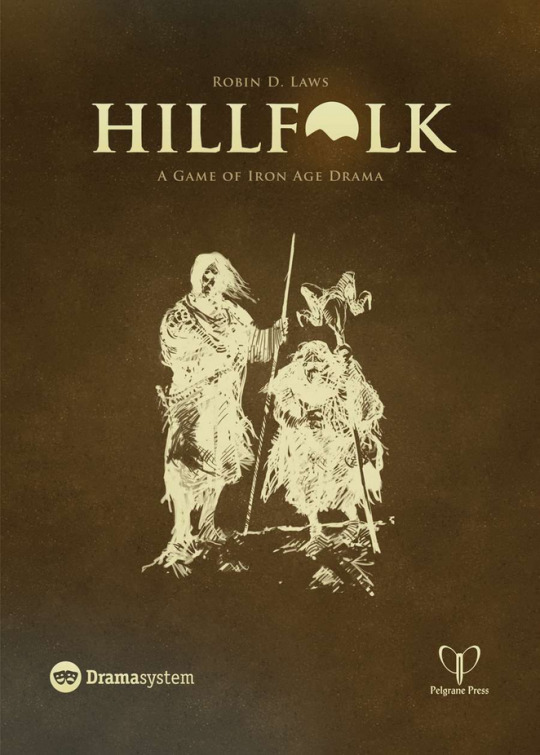

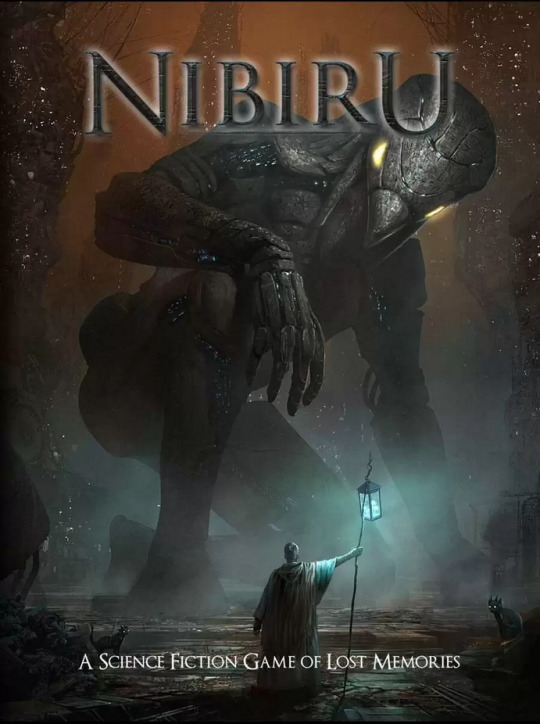
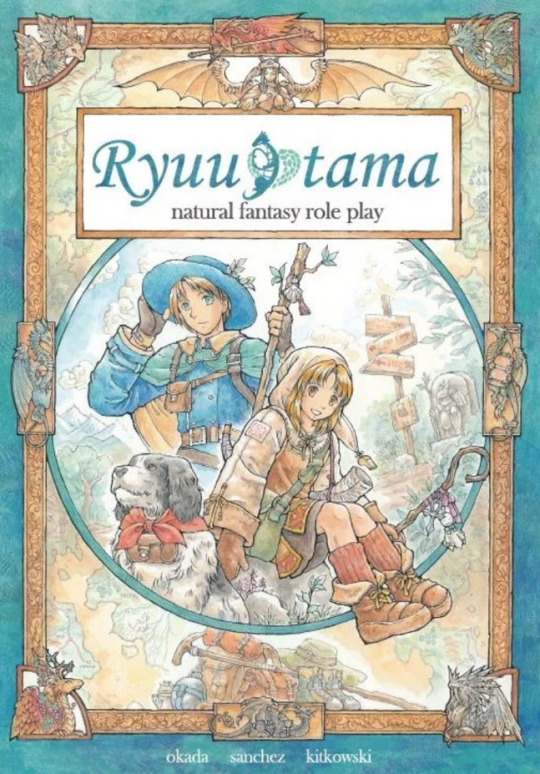
The World of Darkness, by White Wolf / Onyx Path.
World of Darkness games can be about a lot of things; redemption, survival, violence, a search for belonging… but one thing that's pretty consistent across each of the various settings is the complex politics that bind the supernatural societies together.
This isn't to say that there isn't combat in World of Darkness. However, since the games are rooted in horror, fighting isn't wise; much better to make a deal, craft a complex ritual, or convince someone else to stab your problem in the back. The complex factions and warring beliefs of the World of Darkness can foment nefarious plots, strained relationships, and power vacuums that have made this setting a fantastic resource for LARPS, forum roleplay, and so much more.
If you want a system mastery that also requires a strong knowledge of the core setting, you might have a real hoot with the World of Darkness.
Gumshoe Games, by Pelgrane Press.
Gumshoe games are focused on investigation more than anything else, with a very specific and unique mentality around mysteries. The core of a Gumshoe game is the belief that players do not need to roll in order to get access to the clues they will need to solve the mystery. However, the completeness of the clues, extra context, and the goals provided that your characters might want to achieve once they solve the mystery, are all still up for debate. This is where your abilities come in.
Abilities in Gumshoe act as two things: ratings and pools. Ratings represent your standard ability in various skills. Pools are points that can be spent to temporarily increase a rating, which is what you'll likely need to do in order to meet the difficulty number assigned to any specific activity.
As a result, the complexity in Gumshoe lies in resource management; determining which actions are worth spending resources, and which actions you are comfortable choosing to fail. There might also be a layer of strategy in the assembly of clues; an astute group might be able to assemble a more complete picture of whats going on, as well as perhaps the motivations of the parties involved, and potential avenues to solve the problem to avoid certain complications.
There's a lot of GUMSHOE games out there; some include Nights Black Agents (spies vs. vampires), Trail of Cthulhu (Eldritch Horror), Ashen Stars (investigations in space!) and Bubblegumshoe (teenage detectives).
Good Society, by Storybrewers Roleplaying.
Welcome to Good Society, the Jane Austen roleplaying game. Play out your very own regency drama of balls, estates, passions and desires.
Good Society has plenty of layers, with chapters, tokens, reputation, scandal, letter-writing, conflict and upkeep. I don't know if it's technically crunchy in terms of math, but the relationships and the way you interact with society looks a little complex, at least from the outside looking in. As a player, you'll be responsible for both a main character as well as side-characters, resulting in an expansive cast that encourages players to be involved in scenes even when their own main character isn't involved.
Playing a game of Good Society asks your character to be strategic in actions not to preserve hit points, but rather to preserve reputation - both their own, and that of their family or loved ones. Can you still get what you want while preserving your reputation? What sacrifices might you have to make for love? Play Good Society to find out.
Phoenix Wright TTRPG, by Rezzy.
FAN CREATION Based on the Phoenix Wright franchise. The players are divided into prosecution and defense parties, and then each performs its own DM led investigation of a crime scene. After both parties have finished their investigation, everyone is brought back together for a trial to determine the verdict.
If you love sorting out numbers, mods and stats to build a character, you'll probably like the Phoenix Wright TTRPG.
This is a bit of a rough game; the author of it hasn't really done an editing pass recently, but if you want complexity, it has it in spades. You have encounters, but since the entire goal of the game is to solve mysteries and defend your clients in court, combat is the very last thing you want to resort to. You'll be using your abilities to collect evidence, talk to witnesses, deduct motives, and search your personal knowledge in order to find the real culprit.
Hillfolk, by Pelgrane Press.
In the shadow of empires, an epic saga of ambition and desire!
In an arid badlands, the hill people hunger. Your neighbors have grain, cattle, gold. You have horses and spears, courage and ambition. Together with those you love and hate, you will remake history—or die.
With the Hillfolk roleplaying game, you and your group weave an epic, ongoing saga of high-stakes interpersonal conflict that grows richer with every session. Its DramaSystem rules engine takes the basic structure of interpersonal conflict underlying fiction, movies and television and brings it to the world of roleplaying. This simple framework brings your creativity to the fore and keep a surprising, emotionally compelling narrative constantly on the move.
As you build your story, you mold and shape the Hillfolk setting to fit its needs. Do you entangle yourself with the seductions of your wealthy cousins to the north? Do you do battle with the fearsome sea people to the west? Or do you conquer the scattered badlands tribes to forge a new empire of your own?
The DramaSystem of Hillfolk is all about relationships and emotional need; the need for approval, reassurance, respect, reassurance, as well the need to punish, to force subservience upon others, and the desire for power. Relationships are the avenues by which you fulfill these needs.
Character creation for this game feels rather simple, but the way you navigate the game feels like it might still be complex. Each scene in the game is carefully constructed, fleshed out with complications, set pieces, and goals. What you can do in these scenes is also fleshed out: you can rush a scene, call for a time jump, negotiate your inclusion in a scene, and compete for the right to describe what's going on. The themes of negotiation and competition force you to evaluate where exactly you'll want to invest the resources available to you, usually taking the form of a pile of tokens. If you love the interpersonal strategy behind social games, you might like Hillfolk.
The Shadows Beneath, by Rob Justice.
"The Shadows Beneath" is a tabletop role-playing game where players take on the roles of Anglers, fishing in eerie New England waters. The game emphasizes exploration, player-driven narratives, and confronting eldritch horrors. Players must balance the allure of knowledge with the ever-present threat of awakening ancient, terrifying forces. The game features mechanics for handling social, mental, and physical challenges and incorporates a unique Certainty system, where players must manage their character's grasp on reality as they encounter the game's terrifying elements.
The Shadows Beneath is not a long game, but I think it's interesting that it takes elements often considered hallmarks of combat games and re-tools them for fishing. You're always rolling to defeat a Target Number, which is typically a multiple of 5. Anglers will wrestle with the environment, NPCs, other Anglers, and, of course, fish. The game has a Catch Chart that the group will need to reference every time you try to catch a fish.
Some pieces that you'll have to wrestle with as you play include your relationship to other anglers, the traits that you have your strengths in, the reason you're out here fishing, and a track called Certainty; your ability to keep your grasp on reality. Certainty can have a big impact on your character's journey; lose all of it and you start taking Dark Traits, which give you sinister abilities that encourage you to do terrible things.
You also can learn to cast rituals, which require you to sacrifice a part of yourself in the process, deal with Marks, which is wounds and terrible consequences, and upgrade your boat, the most important resource you depend on out on these hostile waters.
Nibiru, by Araukana Media.
Remember Your Past. Secure Your Future
Welcome to Nibiru: A massive space station, home to millions, where stories of drama and struggle are written on a daily basis. Play as the Vagabonds; vagrant souls who wake up in the station without memories of their past. Piece back together their story as you travel through the strange vistas of a skyless world, where nature and artificiality merge into one and where memory and identity shape everything.
I think Nibiru, from a basic understanding of the game, looks less crunchy in comparison to other games, since the basic premise of the game is that you fill the character sheet as you play. However, the gradual way in which you flesh out your character (and their backstory) allows for layers of complexity, as you can learn various mechanics the longer you play.
Advancement in Nibiru happens when you fill out pieces of your character's backstory; with positive memories costing you experience, and negative memories giving you experience. Positive memories give you bonuses to various actions, while negative ones give you a negative modifier. There's also special rules associated with the habitat your character is connected to: Dreadlands characters can use negative memories to exert control over the world, while Brighttown folks can get large amounts of experience from special objects, but are also bound to those objects and must constantly seek them out. The restrictions placed upon you according to your character type constrict you in an interesting way, and I think they fuel really creative play.
Ryuutama, by Kotohi.
Ryuutama calls itself a “Natural Fantasy RPG”. It is a fantasy role-playing game set in a western medieval-style setting. The conceit of this setting is that at one point, in everyone’s lives, people get this intense feeling of wanderlust. They put their daily lives on hold and travel the world with new-found companions. They find out more about the world, and at the same time learn about themselves.
Ryuutama emphasizes travel, exploration, community, friendship, harmony and growth. There is also a “Console RPG-like” combat system: But while combat certainly happens, it’s not the central focus of the game. Adventures usually involve traveling from one town to another, packing gear, crafting items, cooking and sharing along the way; getting lost, meeting people and (sometimes cute) monsters along the way; braving the elements and trying to set camp properly.
If you're a fan of traditional JRPGs, you'll likely find something to love here. There are multiple sub-systems that you'll have to maintain to support your party as they explore a world full of dragons, especially regarding inventory. You need to think about weight, carrying capacity, expiry date, and perhaps even price. This might direct your choices in regards to how far you travel before turning around, whether or not you buy a pack animal, or boosting your ability to navigate properly.
Ryuutama isn't combat free, but I think the focus and complexity of the game is meant to make it so that if you do get into a fight, you can resolve it fairly easily; but the rules and mini-games regarding magic, inventory and travel make it fairly clear that the real story this game is meant to tell is about the journey, and the things you find along the way.
You Might Also Enjoy…
Insane Amounts of Crunch Recommendation Post (Without a specific focus on combat.)
Non-Combat, Heroic Fantasy Recommendation Post.
In-Depth Magic Systems Recommendation Post - especially Ars Magica.
If you like what I do and want to leave a tip, you can check out my Ko-Fi!
81 notes
·
View notes
Text
NEW GAME ALERT
This has been sitting in my brain for a bit too long now. I can feel myself wanting to keep spinning the wheels on this one, so I've made some final tweaks and now here it is! I'll look back over it again in like a month to see if I need to fix anything.

From the game's page:
Maps are interesting. MMORPGs are also interesting. I recently started playing Runescape again, and was intrigued with how the world map had changed since I last played.
That’s what brought this game together. I’ve always wanted to make a map game, but a map game where you are fleshing out an MMO’s map sounds a lot more my style. A lot of the inspiration for this will come from Runescape, but I also have to shout out The Old Republic, Final Fantasy XIV, Maplestory, AdventureQuest, and countless other MMORPGs I’ve played in my life.
-Concept: You (And your friends, if you want) will spend rounds adding certain details or features to a world map of a Massively Multi-Player Online Role-Playing Game, or MMORPG. There are different roles that each player will take on one at a time, which rotate around so everyone gets a chance to play each role. At the end of it, you will have a shared world map and guidebook full of locations, quests, skills, NPCs, details, and encounters.
After a few rounds of this, you move into PART TWO of the game, which involves you, the players, pretending to be people getting back into the MMORPG you just created. You’ll be players returning to the game after having last played ages ago.
I wanted the name to be within the tradition of games like
18 notes
·
View notes
Text
so my post yesterday about how some australians of my age call powerpoints powerpoints because they're fucking called powerpoints was just some notes from my thesis about the work of Jesper Juul in the art of failure. Specifically, it's a essay-slash-book-slash-fat-pamphlet about the idea that videogames are, by volume, failure delivery engines. You spend most of your time, with a videogame, not succeeding. Once you spend most of your time succeeding, you stop being so interested in it.
The reason I like to talk to people about the three forms of failure is because these forms need to be differentiable. Imagine in a videogame if you think your advancement through the level is across this gap but you can't jump it, there is a problem in feedback if you can't tell the difference between:
There's an invisible wall in the game because it doesn't want you coming here at this point in the game
The clipping on the wall you're trying to land on is a bit janky so you keep falling
You're fucking up pressing the jump button
Of those, one of those is super acceptable, like, players should be able to fuck up pressing a button. Similarly in tabletop, players can roll low and should be able to roll low.
The thing is, a videogame can be buggy and fail because of a piece of hardware that's not behaving the way its designer wants it to and may have no control over. For a TTRPG, that piece of hardware is also a player, and that means that they're much more likely to run into problems when they can't properly process rules information (it's been badly communicated to them, or it doesn't work) but also when they aren't properly motivated into executing on the game.
Basically, your GM can be 'buggy' if they're being given bad code to run and they're not able to correct it themselves, and they can be badly calibrated if they aren't attuned to the vibe you are.
128 notes
·
View notes
Text
If we're being 100% honest with ourselves as game designers, we've gotta admit that this notion that "story focus" means making the GM do all the work is not a bugbear that's unique to the Dungeons & Dragons fandom. Think of how many self-identified "story focused" indie RPGs you've bumped into that have a great deal to say leading up to the point of rolling the dice, but once the dice have actually been rolled and the time has come to interpret what those results mean, those same rules that were so keen on procedural rigour just moments ago simply shrug and go "I dunno, have the GM make something up?"
3K notes
·
View notes
Link
10 notes
·
View notes
Text
NEW GAME ALERT
This has been sitting in my brain for a bit too long now. I can feel myself wanting to keep spinning the wheels on this one, so I've made some final tweaks and now here it is! I'll look back over it again in like a month to see if I need to fix anything.

From the game's page:
Maps are interesting. MMORPGs are also interesting. I recently started playing Runescape again, and was intrigued with how the world map had changed since I last played.
That’s what brought this game together. I’ve always wanted to make a map game, but a map game where you are fleshing out an MMO’s map sounds a lot more my style. A lot of the inspiration for this will come from Runescape, but I also have to shout out The Old Republic, Final Fantasy XIV, Maplestory, AdventureQuest, and countless other MMORPGs I’ve played in my life.
-Concept: You (And your friends, if you want) will spend rounds adding certain details or features to a world map of a Massively Multi-Player Online Role-Playing Game, or MMORPG. There are different roles that each player will take on one at a time, which rotate around so everyone gets a chance to play each role. At the end of it, you will have a shared world map and guidebook full of locations, quests, skills, NPCs, details, and encounters.
After a few rounds of this, you move into PART TWO of the game, which involves you, the players, pretending to be people getting back into the MMORPG you just created. You’ll be players returning to the game after having last played ages ago.
I wanted the name to be within the tradition of games like
18 notes
·
View notes
Text
NEW GAME ALERT
This has been sitting in my brain for a bit too long now. I can feel myself wanting to keep spinning the wheels on this one, so I've made some final tweaks and now here it is! I'll look back over it again in like a month to see if I need to fix anything.

From the game's page:
Maps are interesting. MMORPGs are also interesting. I recently started playing Runescape again, and was intrigued with how the world map had changed since I last played.
That’s what brought this game together. I’ve always wanted to make a map game, but a map game where you are fleshing out an MMO’s map sounds a lot more my style. A lot of the inspiration for this will come from Runescape, but I also have to shout out The Old Republic, Final Fantasy XIV, Maplestory, AdventureQuest, and countless other MMORPGs I’ve played in my life.
-Concept: You (And your friends, if you want) will spend rounds adding certain details or features to a world map of a Massively Multi-Player Online Role-Playing Game, or MMORPG. There are different roles that each player will take on one at a time, which rotate around so everyone gets a chance to play each role. At the end of it, you will have a shared world map and guidebook full of locations, quests, skills, NPCs, details, and encounters.
After a few rounds of this, you move into PART TWO of the game, which involves you, the players, pretending to be people getting back into the MMORPG you just created. You’ll be players returning to the game after having last played ages ago.
I wanted the name to be within the tradition of games like
18 notes
·
View notes

